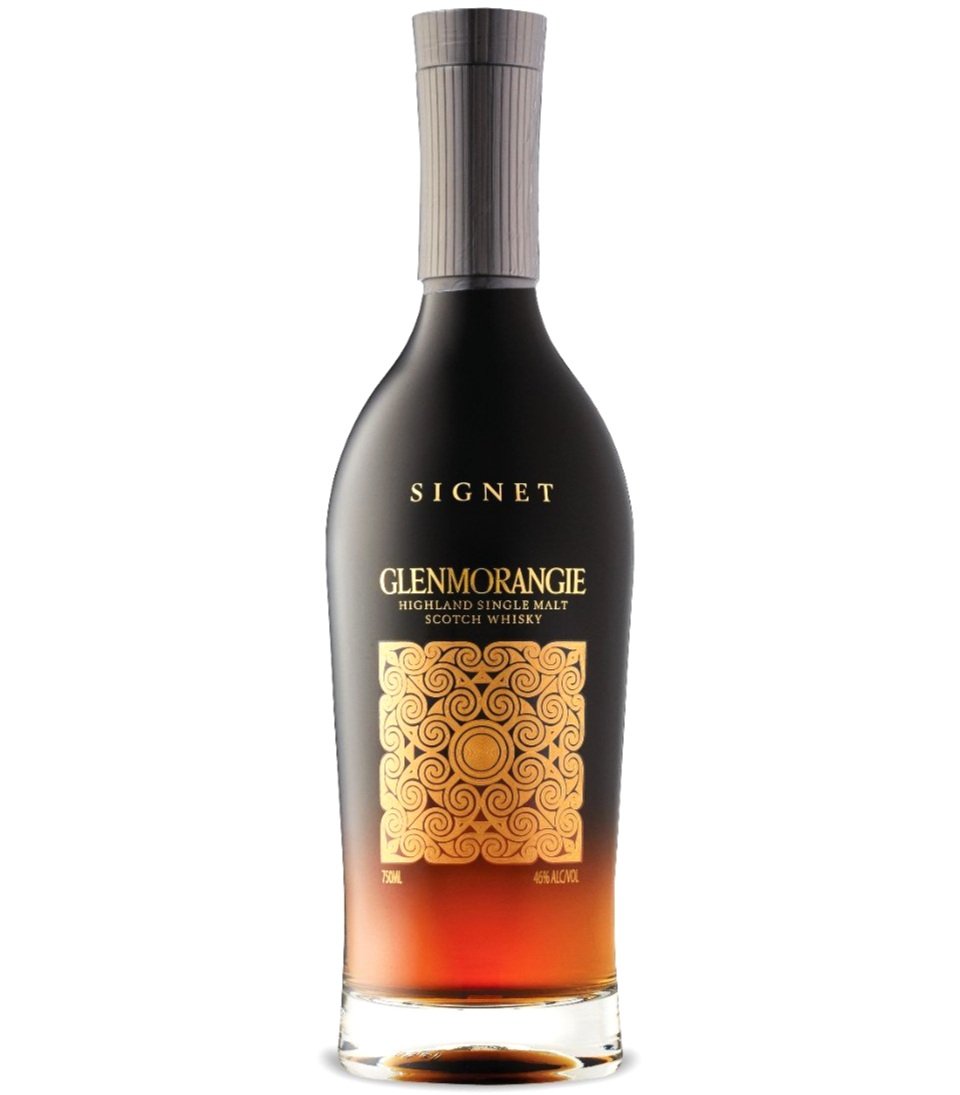Let me begin by saying this is kind of bottle is decidedly not an everyday thing for me, and let's put the Signet's cost into perspective. $250 is about half the price of a big screen TV. It's the cost of a nice set of headphones. $250 will let you run the air conditioning in the dead of summer, all day, for an entire month.
Or think of it this way: $250 is enough to convince a lot of people to go into a room with you — just you and that person and nobody else — and you can do whatever nasty, otherwise unspeakable thing you'd like to them for a whole hour.
Why I'm able to talk about the Signet at all is due to the generosity of my father. It was his Christmas gift, you see. Realizing that dad was probably doing okay as far as boxer shorts, socket wrenches, or flashlights went, my partner and I pitched him on the notion of pooling our funds together and getting just one extra special bottle.
When he unwrapped the Signet at my sister's house, I told him, “Don't wait for me on this one. If you feel like digging into it when you get home, go for it. Just let me know how it is.” Later that night, I received a text that read as follows: This scotch is like nothing I've ever tasted.
“It would have been easier on my wallet if the Glenmorangie Signet was just a ‘pretty good’ scotch. That wasn’t the case at all — the bottle is absolutely outstanding.”
Granted, I was about 85% sure it would be good. The head of Glenmorangie is a guy named Dr. Bill Lumsden. And yes, the man's PhD is in whiskeymaking. Signet is his brainchild; it goes beyond just putting a 20-something number on the side of the bottle and letting consumers draw the usual conclusions about how good it must be.
No, no. That would have been too easy. Instead, the Signet is really a proof of concept—it's Lumsden's sorting through the puzzle of what rules to break and what traditions to keep when it comes to making a damned good whisky on his own terms and without any other preconceptions. Since it hit the market, Signet has been a perennial darling, and every time I saw it reviewed, people seemed to love it.
But I'll admit: maybe 15% of me was hoping it would be pretty good. Not bad, or even mediocre, mind you. Just a kind of quiet good that wouldn’t rattle around in my head too much.
See, the dark side of cultivating taste is that it leads to hard choices. Suppose you test drive a BMW and experience how the engine is just ready to go, and you run your hand across the leather seats and marvel at how smooth they are, and you hear how great the radio sounds even with the local FM station playing Aerosmith's “Dream On” for the ninetieth time. Great! But what then?
“Well, that was sure something!” you might say, falling into your mid-2000s Corolla. On the drive home, you’re just a little more aware of its plastic interior panels, cloth seats that have absorbed a decade’s worth of musty smells, and how the car responds to a spirited press of the gas pedal with labored groans.
Or let's say you finally have a really good cup of coffee. The kind you'd get in a real left-leaning city from a barista in a leather apron who's pulling your shot in between reading chapters of Kierkegaard. Look out, coffee drinkers… This dude is here because he wants to be! As soon as the joy is gone when it comes to making drinks like yours, he’s off to backpack in Europe for months on end, taking his knowledge of the perfect cup with him. Good luck trying to get the same richness and depth of flavor out of your hot water and Folger's crystals.
In either case, now you know what you've been missing. This in turn raises the question: what are you going to do about it? Are you going to up your car payment by a few hundred bucks a month? Are you going to become coffee guy, going out to independent places to buy whole beans, sniffing them through the little vent hole in the bag before you settle on just the right one, and then setting your morning alarm ten minutes earlier so you have time to grind?
Getting to my point: it would have been easier if the Signet was just “pretty good.” Which wasn't the case at all. The Signet is absolutely outstanding.
Glenmorangie says that it uses a strain of barley called “chocolate malt” for the Signet. This term turns out to be surprisingly apt. A rich, velvety chocolate taste is a through-line for the whole experience, and it's a showstopper here. At first, the nose is Nutella-like, with something wonderfully nutty that combines with the chocolate. It’s almost breakfast-like in its first impression — the kind of sweet, carb-heavy breakfast that in your heart of hearts you know is really just dessert by any other name.
After that, it’s time for the big show, where the Signet proves it can cash the check written by all of those baked sweets in the aroma. The generous, chewy malt always reminds you that you’re drinking a whisky, but damned if there isn’t cocoa and cinnamon to burn.
Finally, the experience ends with a permutation of fresh, vibrant flavors. Chocolate is still the star, but now it’s more like grasshopper pie, with graham cracker and mint supporting the mouse. Wow. I mean, just wow. Once it’s over, your taste buds scream at you to get back on the roller coaster.
So, back to that question. What the hell am I going to do with this newfound love of the Glenmorangie Signet? Much as my wallet hates me for saying this out loud, I can’t not buy this again at some point in the future. Like all the best whiskies I’ve had, there’s a point where memory alone isn’t enough to slake desire. A little voice in your head says, “Hey, remember how damn good that stuff was?” Eventually, it grows too loud to ignore.
I can also tell you this: the sticker shock does wear off, assuming you know that you can afford a bottle like this from time to time. Months after the funds have left your custody, the whisky will (likely) remain, always ready for the kind of day that calls for pouring a lavish treat for a loved one, a great friend, or just yourself—because you certainly do deserve good things.*
Take the ride, I say.
*I mean, I think. You could be a real son of a bitch, and in which case, maybe make amends for that baby you kicked rather than buy a crazy expensive scotch.


